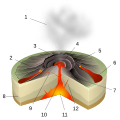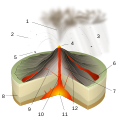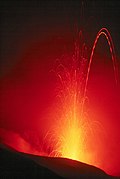Volcanic eruption
Volcanic Eruption
A volcanic eruption is a geological phenomenon that occurs when there is a sudden release of magma, gas, and other materials from a volcano. This process is driven by the internal geothermal energy of the Earth, which causes the magma to rise to the surface through cracks in the Earth's crust, known as vents.
Types of Volcanic Eruptions[edit]
There are several types of volcanic eruptions, classified based on their nature and intensity. These include:
- Effusive eruptions: These are characterized by the outpouring of lava onto the ground. The lava flows slowly and steadily, creating new layers of rock.
- Explosive eruptions: These are violent eruptions that can blast rocks, ash, and gas into the atmosphere. They can cause significant damage and are often associated with stratovolcanoes.
- Phreatomagmatic eruptions: These occur when water comes into contact with magma, causing a steam-driven explosion.
- Strombolian eruptions: Named after the Stromboli volcano, these eruptions are characterized by the ejection of incandescent cinder, lapilli, and lava bombs.
Effects of Volcanic Eruptions[edit]
Volcanic eruptions can have both positive and negative effects on the environment and human societies. On the one hand, they can cause loss of life and property, disrupt air travel, and lead to climate change. On the other hand, the ash and lava released by eruptions can enrich the soil and create new landforms.
Volcanic Eruption Monitoring and Prediction[edit]
Scientists use a variety of methods to monitor and predict volcanic eruptions. These include seismology, gas chromatography, thermal imaging, and satellite imagery. Despite these methods, predicting the exact timing and scale of an eruption remains a challenge.
See Also[edit]
References[edit]
<references />
Volcanic eruption gallery[edit]
-
Lava forms
-
VEI figure
-
Hawaiian Eruption numbers
-
Hawaiian Eruption numbers
-
Ropy pahoehoe
-
Strombolian Eruption numbers
-
Strombolian Eruption numbers
-
Stromboli Eruption
-
Vulcanian Eruption numbers
-
Vulcanian Eruption numbers
Ad. Transform your life with W8MD's Budget GLP-1 injections from $49.99


W8MD offers a medical weight loss program to lose weight in Philadelphia. Our physician-supervised medical weight loss provides:
- Weight loss injections in NYC (generic and brand names):
- Zepbound / Mounjaro, Wegovy / Ozempic, Saxenda
- Most insurances accepted or discounted self-pay rates. We will obtain insurance prior authorizations if needed.
- Generic GLP1 weight loss injections from $49.99 for the starting dose of Semaglutide and $65.00 for Tirzepatide.
- Also offer prescription weight loss medications including Phentermine, Qsymia, Diethylpropion, Contrave etc.
NYC weight loss doctor appointmentsNYC weight loss doctor appointments
Start your NYC weight loss journey today at our NYC medical weight loss and Philadelphia medical weight loss clinics.
- Call 718-946-5500 to lose weight in NYC or for medical weight loss in Philadelphia 215-676-2334.
- Tags:NYC medical weight loss, Philadelphia lose weight Zepbound NYC, Budget GLP1 weight loss injections, Wegovy Philadelphia, Wegovy NYC, Philadelphia medical weight loss, Brookly weight loss and Wegovy NYC
|
WikiMD's Wellness Encyclopedia |
| Let Food Be Thy Medicine Medicine Thy Food - Hippocrates |
Medical Disclaimer: WikiMD is not a substitute for professional medical advice. The information on WikiMD is provided as an information resource only, may be incorrect, outdated or misleading, and is not to be used or relied on for any diagnostic or treatment purposes. Please consult your health care provider before making any healthcare decisions or for guidance about a specific medical condition. WikiMD expressly disclaims responsibility, and shall have no liability, for any damages, loss, injury, or liability whatsoever suffered as a result of your reliance on the information contained in this site. By visiting this site you agree to the foregoing terms and conditions, which may from time to time be changed or supplemented by WikiMD. If you do not agree to the foregoing terms and conditions, you should not enter or use this site. See full disclaimer.
Credits:Most images are courtesy of Wikimedia commons, and templates, categories Wikipedia, licensed under CC BY SA or similar.
Translate this page: - East Asian
中文,
日本,
한국어,
South Asian
हिन्दी,
தமிழ்,
తెలుగు,
Urdu,
ಕನ್ನಡ,
Southeast Asian
Indonesian,
Vietnamese,
Thai,
မြန်မာဘာသာ,
বাংলা
European
español,
Deutsch,
français,
Greek,
português do Brasil,
polski,
română,
русский,
Nederlands,
norsk,
svenska,
suomi,
Italian
Middle Eastern & African
عربى,
Turkish,
Persian,
Hebrew,
Afrikaans,
isiZulu,
Kiswahili,
Other
Bulgarian,
Hungarian,
Czech,
Swedish,
മലയാളം,
मराठी,
ਪੰਜਾਬੀ,
ગુજરાતી,
Portuguese,
Ukrainian







